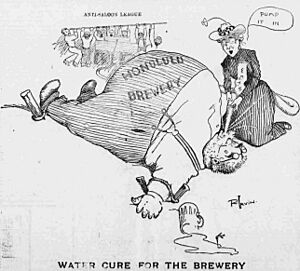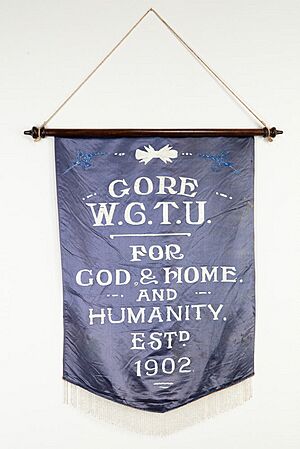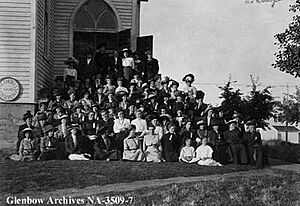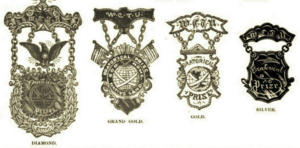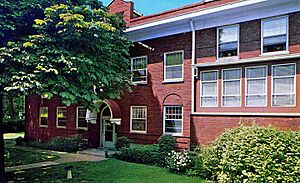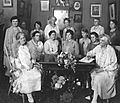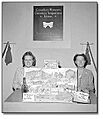Woman's Christian Temperance Union facts for kids
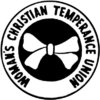
The logo of the WCTU is a white ribbon bow, representing purity.
|
|
| Founded | November 18–20, 1874 |
|---|---|
| Type | Non-governmental organization, Non-profit organization |
| Focus | Temperance movement |
|
Area served
|
Worldwide |
The Woman's Christian Temperance Union (WCTU) is a worldwide group started by women who wanted to make society better. It was one of the first organizations for women focused on social reform. The group used ideas from Christianity to create plans for change.
The WCTU is famous for its role in the temperance movement, which was a campaign to reduce or stop the drinking of alcohol. The group believed this would solve many of society's problems. They helped pass the Eighteenth Amendment, which banned alcohol in the U.S. for a time. They also worked on other important issues during the Progressive Era.
The WCTU was first organized in Ohio in 1873. It officially became a national group at a convention in Cleveland, Ohio, in 1874. Soon, it spread across the globe, with groups in many countries. Today, the WCTU continues its work, focusing on healthy, alcohol-free living.
Contents
What Was the Woman's Christian Temperance Union?
The Woman's Christian Temperance Union (WCTU) was founded in 1874. Its main goal was to create a "sober and pure world." The members believed that avoiding alcohol was key to a good life. They were inspired by the idea of "moderation in all things healthful; total abstinence from all things harmful." This meant that if something was good, you shouldn't overdo it. If something was bad for you, like alcohol, you should avoid it completely.
The WCTU saw alcohol not just as a personal problem, but as the cause of bigger issues in society. They also campaigned against tobacco. As early as 1885, they had a special department to fight tobacco use.
Early Leaders and Their Ideas
The first president, Annie Wittenmyer, wanted the WCTU to focus only on the issue of alcohol. She preferred to stay out of politics.
However, the second president, Frances Willard, had a different idea. She believed the WCTU needed to be involved in politics to achieve its goals. Willard became president in 1879 and led the group for 19 years. Under her leadership, the WCTU grew much larger. She connected the fight for temperance with the fight for women's suffrage, or the right for women to vote.
A Broader Mission for Social Change
Frances Willard encouraged the WCTU to "Do Everything." This meant the group worked on many different social issues. They campaigned for women's right to vote, better working conditions, and public health and safety.
Willard argued that women needed the right to vote to protect their homes and families. At the time, many people thought fighting for the right to vote was too radical. The WCTU offered a more accepted way for women to get involved in public life.
The group also cared about the rights of workers. They worked with labor groups like the Knights of Labor to fight for fair wages and better conditions for workers. They believed that improving life for workers would also strengthen families.
Spreading the Message Worldwide
The WCTU quickly became an international movement. Two years after it was founded in the U.S., it held an international conference. In 1883, the World's Woman's Christian Temperance Union was created. This part of the organization sent missionaries around the globe to start new chapters.
Soon, there were WCTU groups in Australia, Canada, India, Japan, New Zealand, and many other countries. While it started as a Christian group, it tried to include women from other religions as it grew.
The WCTU in New Zealand
The WCTU was very important in New Zealand. A branch was started there in 1884. The American missionary Mary Leavitt helped establish many more branches. She encouraged women to work for the right to vote to protect their families from the effects of alcohol.
The WCTU in New Zealand gave women valuable experience in politics and leadership. One of its most famous members was Kate Sheppard, a leader in the fight for women's suffrage. Thanks to the work of Sheppard and the WCTU, New Zealand became the first country in the world to give women the right to vote in 1893.
The WCTU in Canada
The WCTU also formed in Canada in 1874. Letitia Youmans was a key leader who helped the organization spread across the country. The group was very active in the temperance movement and also played a big role in the campaign for women's suffrage in Canada.
The WCTU and Race
From its early days, the WCTU was mostly made up of white women. However, it did have Black and Indigenous members. In 1901, a Native American woman named Eliza Pierce started her own WCTU chapter in New York.
Black women were also involved from the beginning. They saw the temperance movement as a way to fight for a better society and gain more rights. In 1880, the WCTU created a "Department of Work Among Colored People" to reach out to the Black community.
Frances E.W. Harper's Role
Frances E.W. Harper, a well-known Black writer and activist, became a leader in the WCTU. In 1883, she was named the head of the northern branch of the "Department of Work Among Colored People." She traveled the country, giving speeches and organizing members.
However, Harper became disappointed with the WCTU's white leadership. She felt they were not doing enough to support the Black community. She also disagreed with Frances Willard on how to work with southern members, who were often resistant to racial equality.
Other Black leaders, like Ida B. Wells, also criticized the WCTU for not standing up against racism. By the end of the 19th century, the relationship between the WCTU and many Black women had weakened.
The Fight for Prohibition
The WCTU's biggest political achievement was helping to pass the 18th Amendment in 1919. This amendment started Prohibition, a period when making, selling, and transporting alcohol was illegal in the United States.
The WCTU and other groups had long suspected that beer companies were funding anti-suffrage campaigns. They believed that if women could vote, they would vote to ban alcohol. A Senate investigation in 1919 proved they were right.
After Prohibition became law, membership in the WCTU began to decline. Prohibition was later ended in 1933 by the 21st Amendment.
The WCTU Today
The WCTU is still active today in the United States and in 36 other countries. While the world has changed, the group's main goals have stayed the same. They continue to warn about the dangers of alcohol and other drugs.
To join the WCTU, members must sign a pledge to avoid alcohol and pay yearly dues. The group also runs programs for young people to encourage them to live healthy, drug-free lives. These programs include:
- White Ribbon Recruits: For babies and preschoolers, where mothers pledge to raise their children to be drug-free.
- Loyal Temperance Legion (LTL): For elementary school children.
- Youth Temperance Council (YTC): For teenagers.
The WCTU's main headquarters has been in Evanston, Illinois, since 1910. The building is now on the national register of historic places.
Notable Leaders
Frances Willard
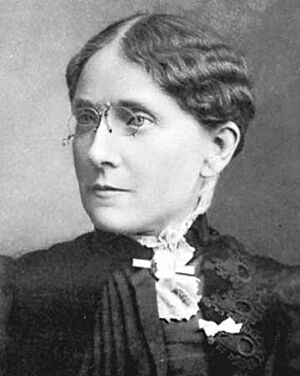
Frances Willard was the WCTU's second president, from 1879 until her death in 1898. She was a powerful leader who greatly expanded the group's mission. She believed in the "Do Everything" policy, which meant tackling many social problems at once.
Willard was a strong supporter of women's right to vote. She argued that if women had a voice in politics, they could help create a better, safer society. She also started the World's WCTU in 1883 to spread the group's message globally.
Matilda Carse
Matilda Carse became an activist after a family tragedy involving a drunk driver. She joined the Chicago WCTU in 1878 and soon became its president. She was a great organizer and fundraiser.
Carse started many charities, including a daycare for working mothers, two schools, and an employment office. She also founded the Woman's Temperance Publishing Association, which published The Union Signal. This newspaper became one of the most widely read women's papers in the country.
Images for kids
See also
 In Spanish: Unión Cristiana de Mujeres por la Templanza para niños
In Spanish: Unión Cristiana de Mujeres por la Templanza para niños
- Frances Willard House (Evanston, Illinois)
- List of Temperance organizations
- List of suffragists and suffragettes
- Scientific Temperance Federation
- Temperance movement
- The Pacific Ensign
- Timeline of women's suffrage
- White Ribbon Association, similar British organization
- Woman's Christian Temperance Union Administration Building
- Woman's Christian Temperance Union Fountain
- Women's suffrage organizations
- Women in the United States Prohibition movement
 | Kyle Baker |
 | Joseph Yoakum |
 | Laura Wheeler Waring |
 | Henry Ossawa Tanner |


